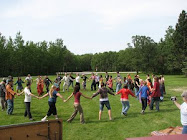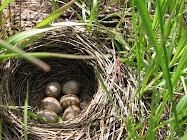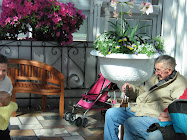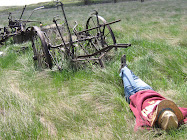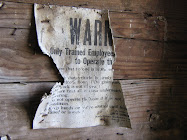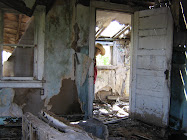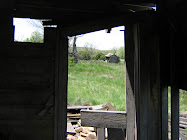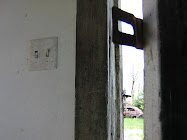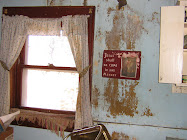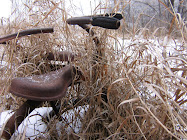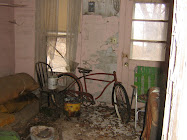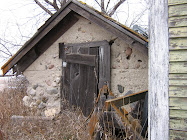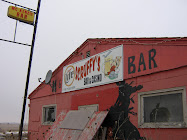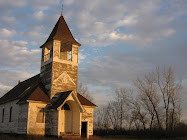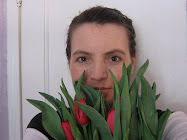Thursday, December 16, 2010
My Favorite Angels
There is a story of angels I long to tell you.
I could begin with Matthew Shepard,
a young guy looking to meet another young guy
or two.
I could begin with Fred Phelps,
a civil-rights attorney, turned God-Hates-Fags
pastor.
Or maybe Romaine Patterson,
just a girl from Wyoming, she says,
who found herself – or put herself –
at the center of debate
about the most publicized
anti-gay hate crime
in our history.
But I am going to begin 10,000 years ago,
when bison and
prairie dogs could see themselves for miles,
when all of our ancestors
were indigenous,
and theater wasn't theater.
It was life.
People gathered,
as some do today,
at the heart of their communities,
to make art with their bodies
to make prayers with their bodies.
And so –
when Matthew Shepard
was tied to a rancher's fence,
and Rev. Fred Phelps and his followers
stood outside the funeral
to tell the world that Matthew was
rotting in hell
for being gay –
Romaine Patterson had 10,000 years
of history
whispering at her feet,
whether she knew it or not.
As the trial of one of Matthew's murderers approached,
Rev. Phelps and his group were expected
once again,
brandishing their usual signs about God
and fags,
along with special signs about Matthew.
Romaine met with her friends.
How to protect Matthew's family?
How to honor the memory of their beloved?
They gathered together plumbing supplies and long swaths of fabric.
They cut and stitched, measured and sewed.
They turned themselves into angels,
meditative angels,
who didn't go to war with Rev. Phelps and his associates,
waging battles of good versus evil,
each side claiming the good.
Instead, they made a circle.
They surrounded Phelps and his group,
bringing silence to the moment –
facing outward,
with their hearts toward Matthew's family.
Together,
wing to wing --
they reclaimed Matthew's story,
rewriting
Phelps's metaphor of Hell.
Romaine, with her supporters,
transformed the living moment,
through an embodied act of theater in the round.
Their action had – and has –
no given name.
Sunday, November 21, 2010
Transgender Day of Remembrance
I have read in Time magazine about man make-up. I have seen the man purse, proudly worn. I know women who feel sexy in a nice, snug pair of men's jeans. Gender-bending seems to have inspired our mainstream sense of fashion, if not our deeper sense of who we are. And still, transgendered people – those who cross gender lines by cross-dressing, cross-identifying, or reassigning their biological sex – have reason to watch their backs.
Transgender Day of Remembrance is a day, or sometimes a week, to mourn and remember those who have been killed because of anti-transgender hatred or prejudice. The first commemoration was held in 1999 to honor Rita Hester, a transgender woman who was stabbed to death in the Boston area on November 28, 1998.
In commemoration of Transgender Day of Remembrance, there are stories I want to tell, hundreds and hundreds of stories. These are just a few that I have learned...
Izmir, Turkey
Azra lived and died in Izmir,
one of Turkey's largest cities,
along the Aegean Sea.
She was a founding
member, the first member,
of the Black Pink Triangle LGBTT Association,
which works for
Lesbian, Gay, Bisexual, Transvestite, and Transgender
rights.
Turkish officials,
including the Minister of the Interior
and the Governor of Izmir,
tried to close Black Pink down.
They claimed:
Black Pink violates
public morality
and Turkey's family structure.
They took Black Pink to court.
But the Turkish judge replied:
“Like other citizens,
lesbians, gays, bisexuals, and transgender people
have a right to create
associations.
This case is dismissed.”
With Azra's help,
Black Pink won the right to agitate.
But that same week,
Azra was shot
and killed, probably by a serial killer,
known for murdering women.
At a vigil in her name –
and the names of
other loved ones –
people wore
pictures of Azra
on their hearts.
Rome, Italy
the Vatican,
the Tiber River, the Colosseum,
Brenda made her living
on the streets.
Maybe she intended it,
or maybe she didn't intend it –
but she found herself
at the center of a scandal.
Piero Marrazzo,
former governor of the Lazio region,
was rumored –
or maybe known –
to seek the services
of transsexual women
in Brenda's line of work.
There was media attention.
There were accusations.
There were illicit videos,
revealed.
In the midst of this,
Brenda died in a fire
in her apartment.
Authorities found
a couple of packed
bags
in Brenda's home.
The County Prosecutor's Office said:
“On Sunday, September 12,
at approximately 5 a.m.,
Victoria Carmen White, 28,
of Newark,
was fatally shot at a private residence
located at 159 Jacoby Street
in Maplewood.
Information released immediately following
the shooting identified the victim
as James White.”
Long Island Channel 12 reported:
“The family of a woman
killed in Maplewood
believes her murder may have been
a hate crime.
Investigators say they are searching for two men
White and her cousin had met
earlier at an Irvington night club.
Relatives now wonder if the men she met
reacted violently
after somehow learning
Victoria was a transgender
woman.”
A friend named “Hortense” said:
“Are you sure that police spokesperson got her facts correct?
From what I understand,
Carmen didn't go out with her two cousins
and was home on the couch asleep when they returned home.
Her cousins brought those thugs up in the house.
Carmen didn't date that element of man.”
A friend named Alanna Carter said:
“I've never met a more radiant
soul.”
the Kalimalang River.
Her body was not
in one piece.
No one
alive
seems to know
her name.
.......
In honor of Transgender Day of Remembrance, there are also poems I long to make, write, scream, sing, demand. Here is the first.
(If you're a regular reader of this blog, you may have seen it before in an earlier form.)
It is...
Dedicated to my transgender friends, relatives, and students
who are very much alive.
Dedicated to the people around the world
who are commemorating Transgender Day of Remembrance this week.
Dedicated to the 150 transgender people
who were murdered in the United States this year.
Dedicated to Roy Antonio Jones III,
a 16-month-old baby who was beaten and choked to death
for acting like a girl.
Dedicated to Azra from Turkey, Brenda from Italy, Victoria Carmen from New Jersey.
Dedicated to the unidentified transgender woman
whose body was found, in pieces, in the Kalimalang River.
Also, this is dedicated to you.
STRANGERS
by Karen Van Fossan
whose name I have never known.
The syllables of her name
might have been sharp against my tongue,
had I ever tried to pronounce them,
which I did not.
The woman was not my friend.
Her sisters were not my friends,
nor her brothers, nor her fathers, nor the mothers of her heart.
I never washed my clothes
knee-deep
in the Kalimalang River
with her.
I never heard her humming
as she combed her tangled hair.
I never knew her favorite things,
the nightmares that made her
gasp for light,
the person or the people
who put her torso,
then her legs,
then her head inside the river.
If I could walk from my river
to hers,
from the mud of my Missouri
to the mud of her Kalimalang,
I would find the pieces of her.
And I would hold the pieces of her.
To each and every piece,
I would
whisper,
It is all right.
There was a woman
whose name I have never known.
The syllables of her name
might have been sharp against my tongue.
And yet, I miss her.
Friday, November 5, 2010
Top Ten Reasons I'm a Pagan
In honor of Lunar Samhain (Halloween on the Lunar Calendar), I have made a short list of the top ten reasons why I practice earth-based spirituality, otherwise known as paganism. According to Samhain traditions, this is the new year, a good time for letting go, cleaning up, making plans, and maybe even making lists. So here's mine...
Top Ten Reasons I'm a Pagan
10) The earth is cool.
9) The stars are cool.
8) The sun is cool.
7) The moon is cool.
6) The dark is cool.
5) The dirt is cool.
4) The ocean is cool.
3) We are cool.
2) Life is cool.
1) Freedom of religion is really cool.
Thursday, August 5, 2010
Home Is Where...
It used to be, back when my dad worked as a minister, his pad of yellow paper was never hard to find. He scribbled down his Sunday sermons just about every Saturday night of my youth.
Today, finding his yellow paper took some doing. But here it is – a page of it anyway. And a pen from PNC Bank, which must have, like his insurance business, sprung up after I moved to North Dakota. The yellow pad was hiding. No, not hiding. Waiting. Taking a rest. Under a stack of catalogs for cars and parts of cars.
When David, my younger brother, was three years old or so, the church ladies asked him, “What does your daddy do?”
Without hesitation, David declared – “Work on cars.”
This gave the United Methodist Women's Group no end of joy in the retelling. And, though I've never been a United Methodist Woman, I take some joy in recounting it myself.
Anyway, here I am, in United Methodist country. The middle of Illinois. I would know it with a blindfold and both hands – with piece of yellow paper – tied behind my back.
The cicadas seem to eat the air itself in this place. The birds sing wet songs, songs that sound like water, like there's nectar in their throats. The green things elbow each other, entwine each other, dance, out-do, reaching for the ever-heavy sun.
I wonder, am I of this place, where people squeeze the produce in ways no one seems to dream of in North Dakota?
As soon as I return here, my fingers itch for a pen, a scrap of empty paper, a story of my own to add to the stories I used to hear – the tales of stolen watermelons, long red fingernails, the black dog of death, the pig who squealed.
Inside that house, through two sets of doors, there is, as my dad puts it, “a living room of stuff.”
Grandma and Grandpa's stuff. The storytellers' stuff.
Today, and then tomorrow, I will wade through that stuff, making minute decisions of great weight. A bag of Grandma's shoes. A humidifier. A wheel chair. The touch-me, singing reindeer that could only have come from Uncle Darrell and Aunt Suzanne.
How many pairs of Grandma's shoes – Grandpa's hankies, knick-knacks, long-forgotten photographs – will travel on the train with me to the quieter, dryer place I now call home?
Home is where the heart is, they say.
And sometimes – home is where there's yellow paper.
Thursday, July 1, 2010
Two Mommies
When I was a little girl, but not so little anymore, I saved my parents thousands of dollars in childcare expenses. Being about five years older than my brother, I was, by force of destiny, the babysitter. Each day after school until 5:14 p.m. (or so), and then all day in the summers, I had two lives in my hands.
When the neighbor boys picked on Davy, I was on it. When Davy wanted to go see a friend, I gave the final OK. I did my best to make sure he was fed, loved, and sometimes entertained.
And it was tough to let this go. From 5:14 onward, not to mention weekends, I found myself suddenly kicked off duty. When my brother made a misstep, I sometimes forgot my parents were home, and I rushed to correct him. My mom developed a catch-phrase for these tricky situations. “Karen,” she would say, “he doesn't need two mommies.”
Being the substitute mommy got my goat. Couldn't I clean a skinned knee, or give sound counsel when my brother had to tell our dad he'd broken the kitchen light? I'm sure my mom wanted to give both David and me a reprieve; Mom could be his mom, and I didn't have to.
Even today, motherhood isn't so easy, especially when two mommies are involved. I was horrified to read these party platforms from the Texas GOP:
Homosexuality tears at the fabric of society, contributes to the breakdown of the family unit, and leads to the spread of dangerous, communicable diseases.
Homosexuality must not be presented as an acceptable 'alternative' lifestyle in our public education and policy, nor should 'family' be redefined to include homosexual 'couples.'
We oppose the recognition of and granting of benefits to people who represent themselves as domestic partners without being legally married.
What's more, the Texas GOP has specifically declared that gays should not have custody of children. Luckily, I suppose, I don't live in Texas.
But here's what I've experienced in North Dakota:
When I first moved to the Peace Garden State, I was barred from being a foster parent simply by virtue of my relationship. When the rules finally changed, Kris and I contacted two foster care agencies. One hadn't heard of the rule change, but promised to call back – and never did. The other, after a grueling 7-month application process, needed more evidence that our 15-year relationship was stable.
In the meantime, I'm proud to say, we got adopted. Our unofficial, honorary, off-the-books daughter has claimed us as her own. This child has been through more hell in her short lifetime than a girl her age should be able to imagine. But what a blessing she is! She reminds me so much of my grandma, I sometimes have to wonder where this good-natured spitfire actually came from. Though she lives with us only on occasional weekends, she has a safe and secure place here, with her name on her bedroom door, two loving (honorary) parents, and a bevy of ornery creatures to adore her.
I am proud to say, after proving the stability of our commitment, Kris and I are now the first same-sex couple to be licensed as foster parents in this region.
I'm also proud to say that my mother taught me plenty about being a mom, how to listen, how to nurture, how take interest.
Today, she agrees – some kids do need two mommies.
Anyway, mine does.
**************
Newsflash (and it's good news!):
The U.S. Department of Labor has just clarified the definition of 'son and daughter' under the Family and Medical Leave Act (FMLA). This change ensures that any employee who parents a child has the right to receive family leave -- regardless of the legal or biological relationship. As Hilda Solis, Secretary of Labor puts it, "No one who loves and nurtures a child day-in and day-out should be unable to care for that child when he or she falls ill...All families, including LGBT families, are [now] protected by the FMLA."
This is good news for moms, dads, grandparents, beloved aunts and uncles -- and especially our kids.
Wednesday, April 28, 2010
Authentic Community: Left, Right, and Center
True Confession Number One:
My father appears to have turned Republican.
True Confession Number Two:
In 2004, my brother argued that John McCain might make a good president.
Final True Confession:
I feel hurt and angered by many of the platforms and practices of today's Republican party.
Should our family shy away from discussing politics? If that's the only way to prevent heartburn at holiday meals – certainly. But what if we could discuss such things authentically? What if our communities could do the same?
To answer this question in my own life, I am inspired by the practice of Authentic Movement, as put forth by Mary Starks Whitehouse, Janet Adler, and Joan Chodorow. In the practice of Authentic Movement, we have three distinct phases.
First, there is a Mover and a Witness. The Mover essentially moves, in any way she or he sees fit. The Witness simply witnesses, sees, offers a presence. Second, the Mover and Witness switch. Witness becomes Mover; Mover becomes Witness. And finally, they speak about their experiences – and only their own experiences.
This third part is the part I'd like to emphasize. Let's say my Authentic Movement partner had raised her arm during her movement time. If I wanted to speak about this experience – I would not say, “Why do you always raise your arm?” or “Arm raisers are evil,” or “Isn't that like a Republican/Democrat/liberal/right-winger?”
I might say, “When I saw you raise your arm, I felt afraid,” or “When I saw you raise your arm, I worried that something bad was going to happen,” or “When I saw you raise your arm, I got angry enough that I wanted to raise mine.”
So, when my friend Don expresses his personal joy that Barack Obama was elected – even though I was never a big Barack Obama enthusiast, I can honor Don's celebration. Or at least I can be willing to hear it – because Don is speaking for himself. We do not steal each other's voices by speaking with our own.
I'd like to see our community overflowing with full, diverse voices – where we do not mute ourselves, but take responsibility for our speech. It's not that we must silence ourselves on the controversial issues of our time, but that we can speak authentically when we speak.
Fifty million years ago – or so – I attended a workshop on conflict resolution through the Conflict Resolution Center at UND. At the time, I was surprised to learn that compromise is not the preferred method of managing conflicts. In a compromise, we look at our opposing goals. I give up a little something, you give up a little something, we attempt to meet in the middle, and possibly neither of us is satisfied.
In the conflict resolution approach, we look at deeper needs, and find ways we might be able to meet those needs expansively, through consensus. It could be, in the end, you get all that you wanted, or I get all that I wanted, or we change what we wanted. But the conflict is resolved if we've managed to meet the needs that brought us to the conflict.
For instance, it used to be that I wanted something that my partner didn't want. My goal was to move to the east and join an intentional community. Kris's desire was to stay here in Bismarck. Had we simply compromised, we might have chosen a spot in the geographic middle of these places – somewhere like Detroit.
What did I need? Community. What did Kris need? Community.
It has taken us years to manage this conflict, but we are able to do so, as long as we look at what is needed, rather than what goal – or position – can be bartered or achieved. It's not that we both deserve a certain outcome to this argument. What's important is that our needs are valued in the relationship. I believe the same is true in families and even this community.
The question I hope we can ask ourselves is, “What is needed in this community of ours?” When we take responsibility to speak from our own experience and voice our authenticity, we help create a culture where authenticity is nurtured – and we are all more likely to get what we need.
So – some examples of authentic speech.
Instead of saying, “That's stupider than stupid!” – we might say, “I didn't like that.”
Instead of saying, “This is the most boring blog I ever read in my life!” – we might say, “I wanted to feel inspired, but I didn't.”
Instead of saying, “George Bush is an evil, low-life scum bag!” – we might say, “I am outraged at the former president, and I would like to see him held accountable.”
Instead of saying, “Did you see those Mexicans? They should be sent home!” – we might say, “When I see footage of immigrants at the border, I feel scared there won't be enough resources to go around.”
If we can do this, if we can further invite authenticity into our speech, our expression, our means of resolving conflicts – we aren't just welcoming discussion at family dinners, we are more fully welcoming ourselves.
Tuesday, March 30, 2010
District #30...We Need a New Representative...Now
“District” is another word for neighborhood, for community, another way of saying, This is my home.
Plenty goes on here, in district number 30. An elderly woman falls, but rejoices that she hasn't harmed her eyes. A mother and son argue about suppertime, a car ride. A couple of wild-tomboy girls stop to pet my wild-tomboy dog.
We live here – in district number 30, neighborhood number 30, community number 30.
And so does Nicole Weiler. In March of last year, her husband assaulted her – in our district, out in public. Arrested and charged, David Alan Weiler pleaded guilty. Then, in March of this year, the Weiler case again made local TV. Nicole had called the police, filed a report, claimed her husband had beaten her again.
Strangely enough – David Alan Weiler works for me. He's one of my Representatives in district number 30. His job is not to thwart the laws, but to make them and refine them, particularly laws that protect us from personal violence. And so, his violence becomes my violence in a way, mine to address, mine to rectify, mine to interrupt.
Some say Nicole Weiler will drop the charges. Some say Dave will heed the public outcry to resign. By the time you read this blog, the story may have grown in many ways.
But there's still domestic violence in my community, there's bullying in my neighborhood, no matter how this story twists and turns. In neighborhood number 30, if we're paying close attention, we know this:
In March of 2009, David Weiler assaulted his wife, Nicole, by his own admission.
Based on decades of research, the Duluth Model teaches us, “If a batterer does not have a personal commitment to give up his position of power [over his partner], he will eventually return to the use of threats or violence to gain control.”
Sadly, I see no evidence that David Weiler has a made this personal commitment. In the year since his first arrest, I've heard him voice no regret, no remorse, no commitment to personal change. I would like to see him make this commitment. If I am wrong about his willingness to practice nonviolence, I look forward to being corrected.
But who has asked Dave to make such a commitment? The courts gave Dave a suspended sentence. The leaders of his party gave him a promotion – a chairmanship of an interim committee. The voters of District 30, like myself, gave him little flack. For one full year, he has lived within a paradigm almost free of accountability.
This is the type of atmosphere in which bullying takes hold, where bullying can thrive, where a person can assume the right to bully.
For all of these reasons, I am working to recall David Weiler. If we gather enough signatures, if our petition is successful, the voters in District 30 could have a chance to vote again. A new election could happen. The people of this district could hold Dave accountable, by voting to replace him – if we choose.
Which brings me back to my neighborhood. The other day, as I biked along Hillside Park, I passed two brothers taking turns spanking their dog. They were young, they were worn out, they didn't know how to handle a pulling puppy. I stopped and showed them what tricks have worked for me with pulling dogs. I let them know I understood how tough it is. For their own sake, these children needed a sense of being accountable, being seen, being challenged to pursue another option.
Violence becomes possible in fractured, broken communities, where the network of relationships does not keep us safe. If we can create vibrant, true community together, maybe we can stop domestic violence – for the sake of Nicole Weiler. For the sake of all our children. For the sake of Dave Weiler, if you like.
Even here in neighborhood number 30.
Wednesday, March 17, 2010
I Didn't Die – Or Did I?
I went ahead and did it. I rode my bike on Boulevard Avenue, in spite of the risks.
Risk 1: Splatter myself with mud.
Risk 2: Splatter myself with slush.
Risk 3: Tempt fate and die.
It was Risk 3 that nearly kept me off Boulevard Avenue forever.
According to one source, Boulevard Avenue was where I would meet my death. In fact, according to this source, I already had.
My dear friend Ferne – who's just about 101 and isn't prone to confusion – recently told her daughter I had died. I'd “been killed” was how she put it. Killed riding my bike on Boulevard Avenue.
Luckily, she was wrong. At least so far.
True, I didn't die on Boulevard Avenue. But just a few weeks ago, I began my own dance of dying.
In a good way.
(Sort of.)
Here's how it began:
I received a letter, which said that the North Dakota Board of Counselor Examiners had refused my application for licensure as a counselor. According to my graduate school, my professors, and myself, I am trained and ready to serve as a counselor. I'm a Dance/Movement Therapist, yes, but also a bona fide counselor.
The Board was unconvinced.
So I had to ask myself, “What next???”
I could...
Move away,
Go back to school,
Learn an alternate trade,
Hire a lawyer,
Count my blessings,
Ride in the middle of traffic on Boulevard Avenue.
In my mind, I found myself running from one idea to the next. And I hated all this running from one idea to the next. Pick a plan and stick with it. That was my general stance.
But suddenly, as I walked beneath the foggy spring sky, I saw my path.
This is it. This running from one idea to the next – this is my life. Today, this is my life. My own real life. My life isn't waiting for me in the answers to my questions. My life is taking place as I grapple with these questions. My life is happening now. My life isn't waiting in the well-plotted future. This is it.
And so, can I dance with this? Can I follow the rhythms and gestures of this dance? Can I be present and alive, letting myself experience my actual experience?
My dream of being a counselor – at least for now – is dying. This is a dance I have witnessed. I have sat with those who are dying. I have seen the stops and starts, the fits of life, the letting go, the ecstasy and the panic.
Today, this is my dance. Will I go here or go there? Will I stop, or will I start?
I don't know.
The knowing isn't now. Today, I have only to dance.
Maybe even up and down Boulevard Avenue.
A Note: Much gratitude to my teachers at Naropa University who helped me learn the dances of living -- and of dying.
Sunday, February 28, 2010
How to Make a Play (a Really Good One)
You should have been there! Or maybe you were.
“How to Make a Play (a Really Good One)” has profoundly influenced my life. I am left with a sense of true joy and ongoing inspiration.
The play itself – “How to Make a Play (a Really Good One)” – came as the capstone to a very brief theater residency with kids, teens, and adults, many of whom experience some type of disability. We wrote the play ourselves, or, more aptly put, we wrote it together.
The show included hand drumming, cats with many ears, a monkey who’s really a spy, cops who look like wolves, bad guys who wear disguises (and sell bananas on the side), a Donald-Duck-Elmo combination, and much more.
We told the story of all the things people like in a play – from music to costumes to mystery to a little imagination. In the end, we revealed the only two things we really need for a play: “Us” and, of course, “you,” the audience.
For the grand finale, the audience joined us as the body of a dragon in a twisting, turning, roaring Dragon Parade.
To this minute, many minutes since the play’s final curtain, I feel overcome with a sense of human possibility for genuine transformation of our world. This feeling is not new exactly; what’s noteworthy for me is how consistently I’m transformed while working with groups of folks who experience disabilities (as well as those who don’t).
Had none of the people in this recent group had any developmental disability, the show would certainly have been different – in ways we can only guess. But it would not have been better.
To have suffered a brain injury or complications at birth – surely these factors change a person. But can we say the person is reduced? Just as those who experience blindness are often renowned for their acute sense of hearing and kinesthetic awareness – so, too, could those who experience developmental and other disabilities be renowned for their keenly developed complementary skills.
I don’t mean to deny hardship or struggle, but to honor the resiliency and personal excellence that exist beyond and even because of this struggle. In this group in particular, I witnessed, among other things, courage, transparency, patience, profound creativity, and extraordinary improvisational spontaneity. This is how the bodies of eight performers could conceive of and construct the shape of one gobbling turkey, for instance – and how, even during the show, performers could invent new and hilarious lines and interactions.
In this group, I also saw a longing that I see in every class I have ever worked with – the longing to be a star of one’s own making, be that funny or dramatic, quiet or unhinged, wordy or succinct.
The performers were stars, each in their own right, not by muting their personal excellence, but by putting it in service of the collaborative whole. By being generous with each other, we could be generous with ourselves. In giving each player the chance to be a star, we co-created a culture in which we all could be stars. The gift we gave was returned to us, something like love – in fact, exactly like love.
Our ways of bringing love to the world may differ, one to the other. But the willingness to love may well be the greatest ability we possess.
As far as I’m concerned, that’s how we make a really good play.
Wednesday, January 20, 2010
Censored in Fargo
It's not the worst thing that ever happened to me – or “The Group That Opened the Box,” as a matter of fact.
Still, the girls in “The Group” were shocked. Disappointed. Angry.
They had planned to share pieces of the play we wrote together. They had planned to tell stories of teenage sexuality, BFFs, pregnancy, and sexual orientation – all with a glimmer in their eyes.
But then I got the call.
Our interview on “The Flag,” AM 1100, had been cancelled.
In fact, all the guests who'd been invited to reflect on women's lives and women's struggles – they were uninvited, too. No more show on women's issues. No more show on girls' desires.
Cancelled. Uninvited. These are euphemisms I use for the real situation:
We were censored.
By now, this is old news. It happened last Friday night, the evening before The Group's rousing performance at MSU-Moorhead.
I'm late getting the word out because of an unrelated event.
Our beloved family cat, Butterfly, died on Sunday morning. I mention Butterfly now, not because I'm asking for your compassion (though, if you have some, we would welcome it). I mention this because her death has shown me the nature of censorship itself.
In mourning the death of Butterfly, we long for many things – to feel the sweet coarseness of her fur again, to see her mottled face again, to hear her scrappy voice again.
Because our cat has died, we can no longer hear her voice.
To the living at least, the dead appear to be voiceless.
When we hear each other's voices, we affirm that we are alive. But when we are censored, when our voices are made voiceless, something within us dies.
“Ignore it, and it will go away,” as the saying goes. Ignore us, and we die, at least a little.
It is long past time for girls' voices to be revived.
Wednesday, January 13, 2010
Ode to the Unhappily Employed
I just decided to apply a little grade school math to my adult life. The math problem:
If 15 million Americans are unemployed, and the unemployment rate is approximately 10%, how many Americans are currently satisfied with their work?
Maybe that's not a fair question. Second try:
If 15 million Americans are unemployed, and the unemployment rate is approximately 10%, how many Americans are currently wondering what the meaning of life could possibly be?
Not fair, either. Last try:
If 15 million Americans are unemployed, and the unemployment rate is approximately 10%, how many Americans currently have employment?
That one, I can answer. Approximately 135 million Americans have jobs.
I don't know, though, how many of them like these jobs or contemplate the meaning of life on a regular basis. What I know is this:
Since joining Facebook, I've noticed that a good number of my Friends (quite justly) grumble about their daily work situations.
Their complaints:
Coworkers are getting on their last nerve.
The work is boring.
The work takes them away from their cute, little kids.
So, while approximately 10% of us are unemployed, many of the rest of us are unhappily employed. Does this seem like the American Dream to you?
Anyway.
Having worked in many settings, in many cities, I've realized that the workplace can be one of the most difficult places to put our dreams into action – or, as Mohandas Gandhi once said, to “be the change we wish to see in the world.”
The workplace seems conspiratorially designed to put your morals to the test – like an undercover cop trying to sell you drugs. But in this case, it's an undercover cop annoying you, boring you, and keeping you from your children.
Unfortunately, I don't have any solutions, not really. “Follow your bliss” is great, but it's too self-absorbed for me. I vote for something more like, “Let's support each other to follow our blisses.” (If blisses is a word.)
All I have to offer is this:
A translation. The translation of our ideals into workplace realities. The translation of what we hold dear into what we face at work.
Ideal Number One:
“Be the change you wish to see in the world.”
Workplace Translation:
“If you want something done right, you got to do it yourself.”
Ideal Number Two:
“Do unto others as you would have them do unto you.”
Workplace Translation:
“Two can play at that game.”
Ideal Number Three:
“The arc of the universe is long, but it bends toward justice.”
Workplace Translation:
“I live for weekends.”
Ideal Number Four:
“The best and most beautiful things in the world cannot be seen or even touched.”
In Workplace Translation:
“You break it, you bought it.”
If you have more translations, please feel free to share them.
Until then, let's keep dreamin'.
Tuesday, January 5, 2010
The Piano Dog, Technology, and Telepathy
Before I sing the praises of modern communication technology (which I'm just about to do), I want to make a confession. Or maybe two.
I am a born optimist. In fact, in high school, I wrote an entire paper arguing for an optimistic reading of Lord of the Flies -- that vastly depressing book. (I got an A.)
I also know that I gravitate toward the outlier's position. It's not that I'll call the sky red if you call the sky blue. But I am behooved (I've never known quite why) to see many perspectives on an issue. The closest I ever got to discarding my deeply-rooted feminism, for instance, was during my first Women's Studies course in college. (My feminism is safe and sound today.)
In other words, after hearing much talk -- and much wisdom -- about how modern technology drives us apart, it's as if I can't help seeing the ways it pulls us together.
First example:
My dear friend Julie is away. Just this very minute, I got an email message from Julie. “Miss you!!!!” it said. Of course, I felt happy and connected, reading her message.
Second example:
The Adventures of “Piano Dog”
by Us
Once upon a time, there was a dog who loved pianos. The only problem was, he had two left feet. Now this created a few problems, namely problems with rhythm. He would try to practice arpeggios, but only to find that he didn't know what they were. He needed someone to help, so he went on a quest, and on the way, saw another dog – and he had two right feet! Except this dog loved to play the triangle. And so, under the full moon, the first dog and the second dog set out in search of a fun-lovin' coyote [KY-oat] who lived in the Sonoran Desert in Arizona. This coyote lived in a silver bullet trailer, and inside of it, she kept a recording studio and scissors for left-handed dogs – as she had been an orthopedist in a previous life, and she collected prosthetic dog legs in various sizes, shapes, and colors. Imagine the faces of those two canine vagabonds when they realized all this potential for making a band! All they needed was a really good band name. But that would have to wait because out of the sky came a...a...a...Could it be?...well...Maybe...or no...I think...wait! Wait! Yes...definitely...it's a...
The story isn't finished, because we haven't finished writing it -- we being “Us,” a combination of total strangers and long-time friends. I posted the first sentence or so on Facebook. From there, the story was picked up by Marilee in Bismarck, Debi in Mandan, Lisa in Fargo, Laura in Chicago, Sara in Georgia, and so on.
Third example:
My partner's distant cousin Ryan (who found our family through electronic networking) recently asked this question on Facebook: “When you were in high school or college language class, were you forced to pick an authentic name to be called in that class? What was it?”
So far, the responses have been Ana, Chloe, Renee, Ursula, Anya, Anja, Juliet (that was mine), Noel, Elena, Heidi, Jeanne, and Perla.
Suddenly, my strange and vulnerable experiences in high school French class became the stuff of connection across the miles.
Fourth and final example:
A couple of weeks ago, I posted a poem to my blog. Maggy in Chicago posted a poem in response, Kathleen in Oregon posted a reply to Maggy's poem, and so on. Using modern technology, we engaged in an age-old art -- telling our life stories and getting feedback.
Having lived in the Western world all my life, these exchanges are as close as I've ever come to sharing winter tales around a fire. Never having lived in a such a circular culture, I relish any coming together of our stories. I see this as a return to our human (narrative) roots.
In my field, Dance/Movement Therapy, there is a belief that humanity (and perhaps other species as well) need to be witnessed -- seen, heard, noticed, and acknowledged. We need this even more than we need to be understood. Not only that, we need to let others know we've witnessed them.
So, when my old friend Michele posts, “Thanks for a super fun NYE!” – my instinct is to reply, “That was one of my favorite New Years Eves ever!” She lets me know she has seen me, I let her know I have seen her. (In the world of Facebook, we also know we are seen by other loved ones and friends.) In these ways, we co-create community.
Really, though, I'm not singing the praises of technology, as much as humanity itself. Like chimps, baboons, gorillas, and bonobos, we thrive when we are connected to one another. While technology drives us apart, we also turn it around to pull us together.
Now for my secret theory:
Generally, people in indigenous cultures say they can rely on psychic communication more than people in technological cultures do. But could it be that telepathy and communication technology have something in common? Both are forms of sharing information across great distances, the transfer of information takes place in largely invisible realms, and the more you think about it, the more incredible it seems that it actually works.
Is it possible that communication technology is like training for telepathy? Soon, even before I check that email, post, or comment – I'll know my friends love me. And they'll know I love them, too.

